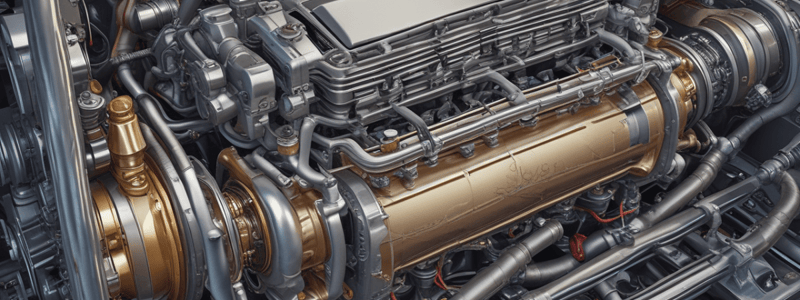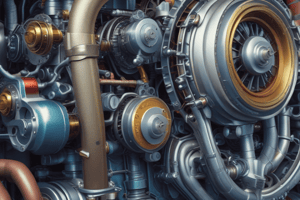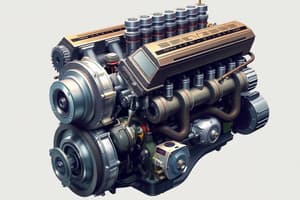Podcast
Questions and Answers
What are the procedures to be followed by the Watchkeeping engineer officer in case of a fire in the machinery space?
What are the procedures to be followed by the Watchkeeping engineer officer in case of a fire in the machinery space?
Find – Inform – Restrict – Extinguish
What is the key safety consideration for dealing with a fire in the machinery space?
What is the key safety consideration for dealing with a fire in the machinery space?
Not to place yourself or other personnel in danger
What should be done first if a flooding of the machinery space occurs?
What should be done first if a flooding of the machinery space occurs?
Inform the bridge
What action should be taken with the bilge pumps in case of flooding in the machinery space?
What action should be taken with the bilge pumps in case of flooding in the machinery space?
What is the primary concern when flooding occurs in the machinery space?
What is the primary concern when flooding occurs in the machinery space?
Why is it important to close all open watertight doors and accesses to the flooded compartment?
Why is it important to close all open watertight doors and accesses to the flooded compartment?
When should the emergency bilge suction be utilized?
When should the emergency bilge suction be utilized?
Why is it important to record Inlet manifold air pressure in the engine log books?
Why is it important to record Inlet manifold air pressure in the engine log books?
What could be a possible cause if the Inlet manifold air pressure readings are outside the normal parameters?
What could be a possible cause if the Inlet manifold air pressure readings are outside the normal parameters?
How does loss of pressure affect combustion in an engine?
How does loss of pressure affect combustion in an engine?
Explain the relationship between turbocharger pressure and intercooler pressure.
Explain the relationship between turbocharger pressure and intercooler pressure.
How do log entries help in fault finding related to pressure data?
How do log entries help in fault finding related to pressure data?
Why is maintaining the required pressure from the turbocharger important?
Why is maintaining the required pressure from the turbocharger important?
What effect can system leaks have on turbocharger pressure?
What effect can system leaks have on turbocharger pressure?
What is the first step to be taken when dealing with contaminated bunkers?
What is the first step to be taken when dealing with contaminated bunkers?
What is the next step to be taken after isolating the contaminated bunkers?
What is the next step to be taken after isolating the contaminated bunkers?
What should be done if the contaminated bunkers are the only ones available?
What should be done if the contaminated bunkers are the only ones available?
What is the likely cause of the engine losing power and misfiring after bunkering marine gas oil for main propulsion purposes?
What is the likely cause of the engine losing power and misfiring after bunkering marine gas oil for main propulsion purposes?
What is the recommended action to be taken if microbial contamination is found to be the cause of the engine losing power and misfiring?
What is the recommended action to be taken if microbial contamination is found to be the cause of the engine losing power and misfiring?
What is the first step to be taken when dealing with a loss of engine power and misfiring after bunkering marine gas oil?
What is the first step to be taken when dealing with a loss of engine power and misfiring after bunkering marine gas oil?
What is the recommended course of action if the contaminated bunkers are the only ones available?
What is the recommended course of action if the contaminated bunkers are the only ones available?
What are the potential consequences of sea water deposits and corrosion on a vessel?
What are the potential consequences of sea water deposits and corrosion on a vessel?
How can water contamination affect lub oils and their performance?
How can water contamination affect lub oils and their performance?
How can water lead to corrosion, particularly in bearings, and what is the potential consequence?
How can water lead to corrosion, particularly in bearings, and what is the potential consequence?
What is the purpose of carefully designing lub oils for their applications and environments?
What is the purpose of carefully designing lub oils for their applications and environments?
What are some common log entries that do not involve machinery temperatures, pressures, or other parameters?
What are some common log entries that do not involve machinery temperatures, pressures, or other parameters?
Why is it important to make an additional note when machinery is topped up with lubricants?
Why is it important to make an additional note when machinery is topped up with lubricants?
What is the significance of recording key machinery operations, such as making ready and testing main engines for departure?
What is the significance of recording key machinery operations, such as making ready and testing main engines for departure?
Explain the importance of checking the standby pumps for the cooling system during the pre-UMS checks.
Explain the importance of checking the standby pumps for the cooling system during the pre-UMS checks.
Why is it essential to check for water content in the fuel settling and service tanks before switching to UMS?
Why is it essential to check for water content in the fuel settling and service tanks before switching to UMS?
Describe the importance of checking the fire detection systems before switching to UMS, and the contingency plan if these systems are not fully operational.
Describe the importance of checking the fire detection systems before switching to UMS, and the contingency plan if these systems are not fully operational.
Explain the significance of checking the air receivers and compressors during the pre-UMS checks, and the potential consequences of not doing so.
Explain the significance of checking the air receivers and compressors during the pre-UMS checks, and the potential consequences of not doing so.
Discuss the importance of checking for leaks in the bilges and the potential risks associated with undetected leaks during UMS operation.
Discuss the importance of checking for leaks in the bilges and the potential risks associated with undetected leaks during UMS operation.
Explain the importance of conducting a full set of machinery rounds before switching to UMS, and the potential risks of not doing so.
Explain the importance of conducting a full set of machinery rounds before switching to UMS, and the potential risks of not doing so.
Discuss the significance of checking the purifier operation and coalescer filters during the pre-UMS checks, and the potential consequences of not doing so.
Discuss the significance of checking the purifier operation and coalescer filters during the pre-UMS checks, and the potential consequences of not doing so.
Explain the importance of verifying the correct operation of the cooling system's header tank levels during the pre-UMS checks.
Explain the importance of verifying the correct operation of the cooling system's header tank levels during the pre-UMS checks.
Discuss the significance of checking the air compressor running hours during the pre-UMS checks, and the potential risks associated with not doing so.
Discuss the significance of checking the air compressor running hours during the pre-UMS checks, and the potential risks associated with not doing so.
Explain the importance of ensuring sufficient fuel reserves in the settling and service tanks before switching to UMS, and the potential risks associated with inadequate fuel reserves.
Explain the importance of ensuring sufficient fuel reserves in the settling and service tanks before switching to UMS, and the potential risks associated with inadequate fuel reserves.
Flashcards are hidden until you start studying
Study Notes
Contaminated Bunkers
- Bunkers must be isolated and tested for water content before notifying DPA and bunker agent
- If bunkers are the only ones available, they must be purified until they are satisfactory
- Discharge bunkers and clean tanks and piping systems if contaminated with microbes
Engine Losing Power and Misfiring
- Possible cause: microbial contamination of fuel system
- Solution: discharge fuel, clean and treat fuel system with biocide, and perform repeated flushes and checks
Fire in Machinery Space
- Procedures to follow: Find, Inform, Restrict, Extinguish
- Ensure safety, identify seat of fire, raise alarm, restrict fire from combustible materials and air, and attempt to extinguish using appropriate fire-fighting media
Flooding of Machinery Space
- Primary concerns: stability of vessel and protection of electrical supply
- Inform bridge, activate bilge pumps, close watertight doors, and utilise emergency bilge suction if necessary
Inlet Manifold Air Pressure
- Log entries help build fault-finding picture, considering turbocharger and intercooler data
- Check for system leaks, intercooler blockage, and poor combustion air supply, which can lead to poor scavenging, poor combustion, and loss of efficiency and power
Log Entries
- Common log entries include:
- Tank soundings
- Fuel and lubrication consumptions
- Vessel's state (at sea, on passage, etc.)
- Arrival and departure stand-by times
- Machinery operations and testing
- Cooling systems checks
- Bilge conditions
- Machinery condition
- Fuel systems checks (settling tanks, service tanks, and purifiers)
UMS Machinery Space Preparation
- Checks and procedures to carry out before switching to UMS include:
- Air systems checks (receivers, drains, and compressor sumps)
- Fire detection systems checks (full operating order, otherwise implement fire watch system)
Studying That Suits You
Use AI to generate personalized quizzes and flashcards to suit your learning preferences.




